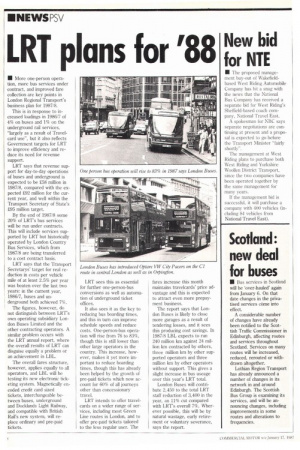LRT plans for '88
Page 20

If you've noticed an error in this article please click here to report it so we can fix it.
• More one-person operation, more bus services under contract, and improved fare collection are key points in London Regional Transport's business plan for 1987/8.
This is in response to increased loadings in 1986/7 of 4% on buses and 1% on the underground rail services, "largely as a result of Travelcard use", but it also reflects Government targets for LRT to improve efficiency and reduce its need for revenue support.
LRT says that revenue support for day-to-day operations of buses and underground is expected to be £58 million in 1987/8, compared with the expected £92 million for the current year, and well within the Transport Secretary of State's £95 million target.
By the end of 1987/8 some 20% of LRT's bus services will be run under contracts. This will include services supported by LRT but historically operated by London Country Bus Services, which from 1987/8 are being transferred to a cost contract basis.
LRT says that the Transport Secretarys' target for real reduction in costs per vehicle mile of at least 2.5% per year was beaten over the last two years: in the current year, 1986/7, buses and underground both achieved 7%.
The figures, however, do not distinguish between LRT's own operating subsidiary London Buses Limited and the other contracting operators. A similar problem occurs with the LRT annual report, where the overall results of LRT can disguise equally a problem or an achievement in LBL.
The overall fares structure, however, applies equally to all operators, and LBL., will be testing its new electronic ticketing system. Magnetically encoded credit card sized tickets, interchangeable between buses, underground and Docklands Light Railway, and compatible with British Rail's new system, will replace ordinary and pre-paid tickets. LRT sees this as essential for further one-person-bus conversions as well as automation of underground ticket offices.
It also sees it as the key to reducing bus boarding times, and this in turn can improve schedule speeds and reduce costs. One-person-bus operation will rise from 76 to 83%, though this is still lower than other large operators in the country. This increase, however, makes it yet more important to reduce boarding times, though this has already been helped by the growth of pre-paid tickets which now account for 60% of all journeys other than concessionary travel.
LRT intends to offer travelcards on a wider range of services, including most Green Line routes in London, and to offer pre-paid tickets tailored to the less regular user. The fares increase this month maintains travelcards' price advantage and this is expected to attract even more prepayment business.
The report says that London Buses is likely to close more garages as a result of tendering losses, and it sees this producing cost savings. In 1987/8 LBL expects to run 240 million km against 24 million km contracted by others, three million km by other supported operators and three million km by other operators without support. This gives a slight increase in bus useage over this year's LRT total.
London Buses will contribute 2,450 to the total LRT staff reduction of 3,400 in the year, an 11% cut compared with LRT's overall 7%. Wherever possible, this will be by natural wastage, early retirement or voluntary severance, says the report.












































































